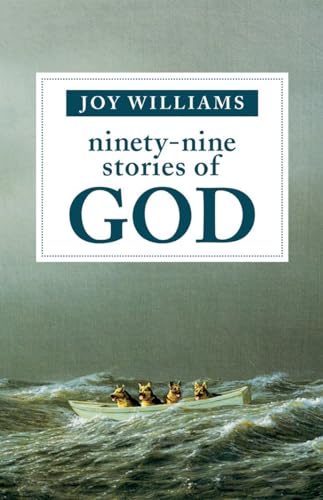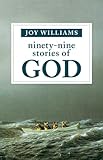
1.
Because the ineffable deserves a voice that captures its curves and cracks.
2.
The best American fiction about God is being written by women.
3.
A few: Marilynne Robinson, Alice McDermott, Toni Morrison, Erin McGraw, Jamie Quatro, Joy Williams.
4.
Many critics will contort themselves into knots in order to avoid finding God in works of fiction by secular literary saints, and yet there she/he/it is, everywhere.
5.
“I believe that God is (and must be) a transcendent presence in any worthy work of art.” — Joy Williams.
6.
“As a dog returns to its vomit, so fools repeat their folly.” — Proverbs 26:11.
7.
I always thought the above quote best describes the fiction of Flannery O’Connor, the Southern Catholic who skewered the literalists who surrounded her.
8.
It is tempting to compare Williams to O’Connor. Some might even call it reductive.
9.
They are not the same, but they have one important similarity.
10.
Both Williams and O’Connor find God in the gross, the morbid, the sinners, the slobbering, the strange.
11.
So did Gerard Manley Hopkins, Graham Greene, Fanny Howe.
12.
“The church has done tons of practical good for the poor, has managed to accept the maddest among us, has a huge margin for visions, and has handed along, through the strangeness of dissecting time, one set of gestures.” — Fanny Howe.
 13.
13.
God is in those gestures. Ninety-Nine Stories of God is a sequence of those gestures.
14.
If you have read even half a story by Williams, you know that she is God-saturated.
15.
Her father was a Congregational minister.
16.
Although I would place her more as an Episcopalian writer.
17.
It is difficult — perhaps foolish — to conjecture the religious practices of a writer, even if that writer writes of God often, effusively, exclusively.
18.
Writers are liars.
19.
Yet it is helpful when writing about writers who include God in their fiction to see how they pivot. What language, what liturgy, what culture, what gestures.
20.
Williams’s priests and parishes and parishioners hold an Episcopal aesthetic.
21.
She writes of mystery and image, but she is not a Catholic writer (they include more bells and incense and guilt).
22.
Ninety-Nine Stories of God is gorgeously written, sentence-to-sentence, and arrives in vignettes that are condensed but not constrained; tight but not dry.
23.
These vignettes carry the accumulated weight of gesture, which allows them to exist beyond their truncated nature.
24.
From Williams’s short story, “The Girls,” describing a family’s Episcopalian priest, who is staying at their home:
The priest spent most of his time in the garden wearing only a bright red banana sling, his flabby body turning a magnificent somber brown. The girls were certain their parents regretted inviting him for he was not at all amusing, the way he could be frequently, in the pulpit.
25.
A prototypical Williams sentence teeters without toppling over.
26.
Joy Williams wrote to the writer Lincoln Michel that two essential attributes of the short story form are that it contains “an anagogical level” and “sentences that can stand strikingly alone.”


 27.
27.
In “The Girls,” Father Snow is depressed over the death of his lover. His sorrow almost becomes entertainment for the titular unnamed girls, who are 31 and 33 years-old. “The Girls” appears along with 45 other stories in The Visiting Privilege, Williams’s recent collection of new and selected fiction. Although best known for her novels The Quick and the Dead and The Changeling, her short work is her most unique.
28.
Williams channels the gestures of “The Girls” in Ninety-Nine Stories of God, but these tales are chiseled out of even more eccentricity. His small prayers before cocktail hour were “merely one of his excruciatingly annoying habits.”
29.
“Prayer is a means of getting rid of some of our own ignorance about ourselves, Father Snow had always said.”
30.
Father Snow again says that he misses his lover, but the girls quip that Donny “was so typical,” and “had that high-water mark like on his teeth.” “The girls,” Williams writes, “found the ensuing awkward moment quite satisfying.”
31.
The moment gets even more awkward as the sordid history of the girls’ parents is revealed — a particular sin revealed, of course, by the mischievous girls. The word “repent” is spoken.
32.
It is Father Snow who transcends the moment, and not more than a page after Williams describes him annoyed by the girls and making a martini “without ceremony,” since “there were simply some situations which did not allow for the sacrilization of the ordinary which he otherwise made every effort to observe.”
33.
I trust a writer who speaks of God and faith tongue-in-cheek rather than tongue stuck-out. The latter takes itself far too seriously.
34.
(Perhaps J.F. Powers is a better comparison for Williams than O’Connor. But Williams, in the end, is without equal.)
35.
Ninety-Nine Stories of God is a very smart and timely book. I have read it twice now and taken photographs of single pages and recited them as prayers, because prayers should be strange, and they should often sting.
36.
It captures the spirit of fine stories like “The Girls” but its method and purpose are different. Since the book announces itself as an anthology, a sequence of stories, we have hope for her chosen form, and the book does deliver. I could not have read a dozen of these from most writers. I would read a hundred more from Williams. Each story is short, prose-poetic but focused, and opens toward ambiguity. Titles appear at the end; I call them titles because they appear in the table of contents, but they are sometimes better imagined as responses to the stories.
37.
Responses from the congregation? Maybe.
38.
There are few things more Episcopalian than a well-timed smirk at hypocrisy.
39.
Some standout tales from the collection include “Aubade,” “Wet,” “Moms,” “This Is Not a Maze,” “And You Are,” “Abandon All Hope,” “Shaken,” “Naked Mind,” and “Inoculum.”
40.
“Inoculum” begins: “The Lord was in line at the pharmacy counter waiting to get His shingles shot.”
41.
I recently wrote an essay for “The Sewanee Review” titled “Does Belief Matter in Fiction,” in which I argue that there are tangible and important differences in the fiction of practicing versus culturally Catholic writers. While Catholic fiction is a particular case for several reasons, we might apply that argument to various denominations and faith beliefs. On the one hand, I understand that it feels biographically slippery to conjecture the faith of a writer unless that faith is stated. Perhaps even if that faith is stated. Yet to not ask the question—to plead that we can’t tether biography to fiction, that we can’t wonder if a writer’s wonder about God is fair game — feels like a conveniently secular critical escape. One that mistakes literature about God for devotional texts or tracts.
42.
One that doesn’t account for writers like Ron Hansen, Flannery O’Connor, and Joy Williams.
43.
I like that a story in this book is part of an instructional manual that includes specifications for a tarpaulin.
 44.
44.
Joy Williams said she partially channeled Thomas Bernhard’s The Voice Imitator: 104 Stories when writing Ninety-Nine Stories of God. The collection was originally published through Byliner as an e-book, but Williams, who has no “TV or Internet or air-conditioning,” has “never even seen how [the book] appears to others. They are as vapor to me.”
45.
In another story, the main character is part of a marathon reading of Dante’s Inferno that began on Holy Thursday and extends to Good Friday.
46.
“He liked his slot . . . His was the third ring of the Seventh Circle, the ring of burning sand which torments those who were violent against God, Art, and Nature.”
47.
After the reading, someone driving a BMW cuts through the church’s parking lot.
48.
The character’s response: “Without reflection, he put out his hand and extended the middle finger.”
49.
If a writer believes that we are surrounded by the ineffable, she will choose a net whose mesh is small enough to capture the ordinary.
50.
“I think the writer has to be responsible to signs and dreams. Receptive and responsible. If you don’t do anything with it, you lose it. You stop getting those omens.” — Joy Williams.








